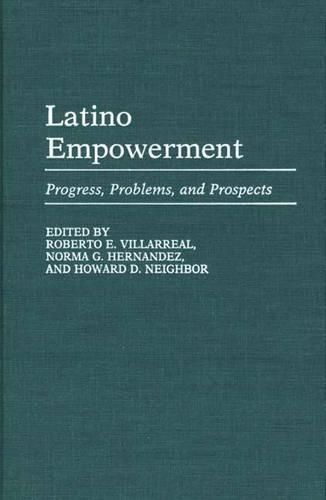
Latino Empowerment: Progress, Problems, and Prospects
(Hardback)
Publishing Details
Latino Empowerment: Progress, Problems, and Prospects
By (Author) Norma G. Hernandez
By (author) Howard Neighbor
By (author) Roberto E. Villarreal
Bloomsbury Publishing PLC
Praeger Publishers Inc
17th November 1988
United States
Classifications
Tertiary Education
Non Fiction
323.116073
Physical Properties
Hardback
176
Description
This exemplary contribution to the literature on ethnic studies examines the issues surrounding Mexican-American political empowerment in the United States. The chapters, originally contributions to a symposium at the University of Texas in El Paso, are uniformly engaging, rigorous in their analysis, and richly suggestive in their conclusions. This exceptionally fine collection discusses the political history of Mexican-Americans, the role of their interest groups, educational models, local bureaucracies, and electoral strategies. Noteworthy are the barriers to Chicano authority found in Los Angeles and Texas. Strongly recommended. Library Journal This timely book is among the first to be published that directly addresses the political empowerment of Hispanics. The contributors concern themselves not only with the progress and problems of political empowerment, but also with the prospects of future empowerment--the political strategies and agendas for the next decade. Conducted by a group of scholars well known for their research on Chicano politics, the studies suggest that while substantial progress has been made in opening political doors to Mexican Americans, most of their political potential has yet to be realized. The volume begins with an overview of the history of Mexican-American political empowerment from 1850 to the present. Institutional, procedural, and ideological barriers to success in American politics for Mexican- Americans are reviewed. An examination of two major politics for paradigms for educational achievement reflect different views on educational success and failure. The bureaucracy of local government and its sensitivity in increasing political representation in Los Angeles, the development of political organization and leadership, and future legal issues are covered. In the conclusion, the various perspectives of the contributors are synthesized to point the way to the next level of Mexican-American empowerment, and ultimately, to a general theory of political integration.
Reviews
A collection of essays on the problems of Latino empowerment written by Chicano political scientists. It provides a solid political synthesis of Mexican-American political history, concentrating on the structural barriers to Latino empowerment vis-a-vis bureaucracies and the economic system. Profiles of Los Angeles, San Antonio, and El Paso are excellent. Benjamin Marquez's The League of United Latin American Citizens and the Politics of Ethnicity' critically analyzes the Mexican-American community's largest organization, dealing with middle-class interests of its members and its struggle against racism. Henry Flores's Structural Barriers to Chicano Empowerment' uses a comparative framework to identify the role of liberal democracy in limiting Mexican-American access to American institutions. Other essays are of equal quality. An introduction to the field of Chicano studies, it also raises questions that will provoke mature scholars. A good bibliography and index. . . . For all college and university students and general readers.-Choice
This exemplary contribution to the literature on ethnic studies examines the issues surrounding Mexican-American political empowerment in the United States. The chapters, originally contributions to a symposium at the University of Texas in El Paso, are uniformly engaging, rigorous in their analysis, and richly suggestive in their conclusions. This exceptionally fine collection discusses the political history of Mexican-Americans, the role of their interest groups, educational models, local bureaucracies, and electoral strategies. Noteworthy are the barriers to Chicano authority found in Los Angeles and Texas. Strongly recommended.-Library Journal
"This exemplary contribution to the literature on ethnic studies examines the issues surrounding Mexican-American political empowerment in the United States. The chapters, originally contributions to a symposium at the University of Texas in El Paso, are uniformly engaging, rigorous in their analysis, and richly suggestive in their conclusions. This exceptionally fine collection discusses the political history of Mexican-Americans, the role of their interest groups, educational models, local bureaucracies, and electoral strategies. Noteworthy are the barriers to Chicano authority found in Los Angeles and Texas. Strongly recommended."-Library Journal
"A collection of essays on the problems of Latino empowerment written by Chicano political scientists. It provides a solid political synthesis of Mexican-American political history, concentrating on the structural barriers to Latino empowerment vis-a-vis bureaucracies and the economic system. Profiles of Los Angeles, San Antonio, and El Paso are excellent. Benjamin Marquez's The League of United Latin American Citizens and the Politics of Ethnicity' critically analyzes the Mexican-American community's largest organization, dealing with middle-class interests of its members and its struggle against racism. Henry Flores's Structural Barriers to Chicano Empowerment' uses a comparative framework to identify the role of liberal democracy in limiting Mexican-American access to American institutions. Other essays are of equal quality. An introduction to the field of Chicano studies, it also raises questions that will provoke mature scholars. A good bibliography and index. . . . For all college and university students and general readers."-Choice
Author Bio
ROBERTO E. VILLARREAL is Associate Professor and Chairman of the Department of Political Science, University of Texas, El Paso. NORMA G. HERNANDEZ is Professor of Teacher Education at the University of Texas, El Paso. HOWARD D. NEIGHBOR is Professor of Political Science, University of Texas, El Paso.
